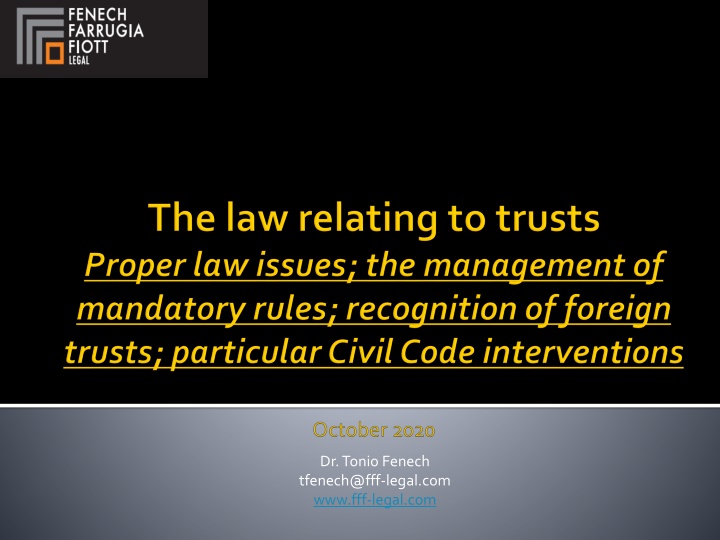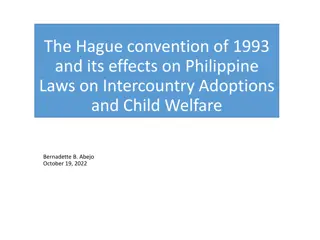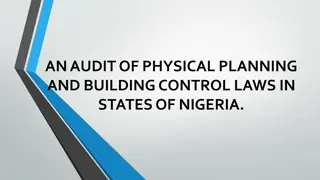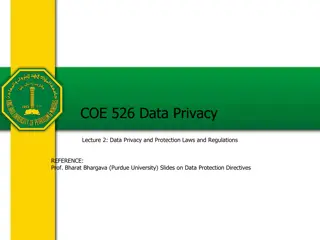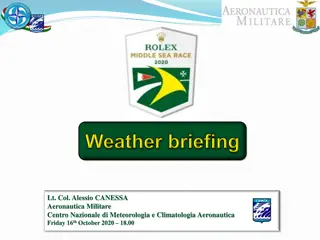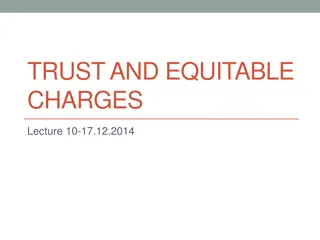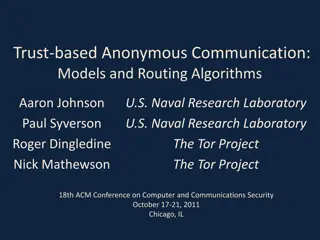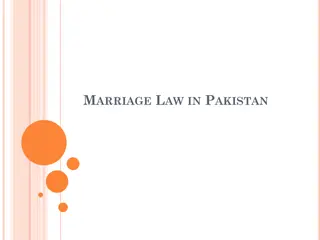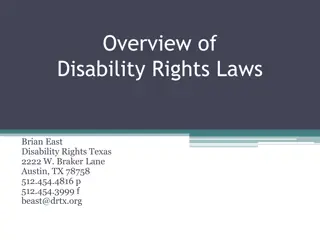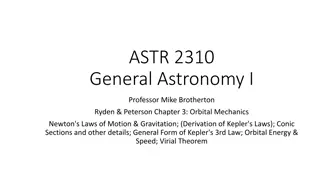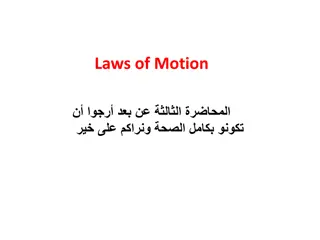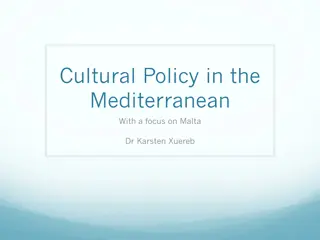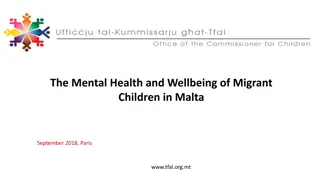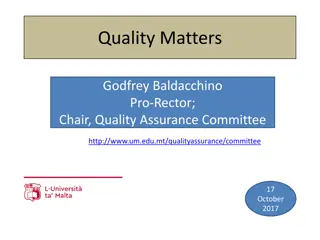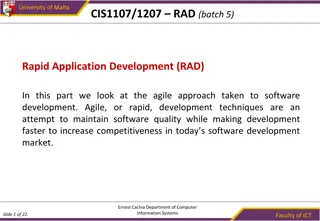Trust Laws in Malta: A Comprehensive Overview
Malta has integrated trusts into its legal framework, providing rules for the governance and administration of trusts. The proper law of a trust determines its validity and interpretation. The Hague Convention on Trusts plays a significant role in regulating trusts governed by foreign laws.
Download Presentation

Please find below an Image/Link to download the presentation.
The content on the website is provided AS IS for your information and personal use only. It may not be sold, licensed, or shared on other websites without obtaining consent from the author.If you encounter any issues during the download, it is possible that the publisher has removed the file from their server.
You are allowed to download the files provided on this website for personal or commercial use, subject to the condition that they are used lawfully. All files are the property of their respective owners.
The content on the website is provided AS IS for your information and personal use only. It may not be sold, licensed, or shared on other websites without obtaining consent from the author.
E N D
Presentation Transcript
Dr. Tonio Fenech tfenech@fff-legal.com www.fff-legal.com
Dr. Tonio Fenech tfenech@fff-legal.com www.fff-legal.com
(1) Subject to the provisions of this Act, a trust shall be governed by its proper law and shall be interpreted and be enforceable accordingly. (2) The proper law of the trust shall be determined in accordance with this Act. (3) The terms of a trust may provide for the proper law of the trust to be changed to the law of another jurisdiction. www.fff-legal.com
Article 5A of the T&T Act confers the force of law in Malta to most of the Articles of the Hague Convention on Trusts, with the relevant provisions reproduced as a Schedule to the Act. The full formal reference to the Convention is Convention on the Law applicable to Trusts and on their recognition, adopted by the Hague Conference on Private International Law on 20 October 1984, and which came into force on 1 January 1992. www.fff-legal.com
(2) When the proper law of a trust is a foreign law, the validity of the trust, its construction, its effects and the administration of the trust shall be governed by such foreign law and shall be recognised and given effect to in Malta in accordance with the Convention and this Act. (3) The administration of a trust may be regulated by a law different from the proper law of the trust. www.fff-legal.com
Dr. Tonio Fenech tfenech@fff-legal.com www.fff-legal.com
Malta has integrated trusts into its domestic law since 2004, and the legislator decided to provide for general rules as to the effects of trusts in the Civil Code, both in general as well as in particular civil situations. The Legislator has furthermore decided to specifically deal with Maltese trusts that have no real connection with Malta. www.fff-legal.com
Notwithstanding any other law, where the law of Malta is the proper law, as the chosen law of the trust, or as determined by Art. 7 of the Hague Convention: the validity of the trust, its construction, its effects and the administration of the trust shall be governed by this Act and other provisions of Maltese law on trusts www.fff-legal.com
Civil Code. Obligations in general under the Civil Code now include Fiduciary Obligations , ie Art. 1124A-J; Art. 958L(1): Property under trusts shall be regulated by the speciallaw on trusts and to the extent applicable, the rules of this Coderelating to trusts. The Trusts & Trustees Act (originally enacted as the Offshore Trusts Act in 1988 but substantially amended on various occasions since then), is Chapter 331 of the Laws of Malta. www.fff-legal.com
Transactions relating to property including the settlement of property under trusts, even when effected by unilateral declaration or resulting from a judgement or order of a court; the distribution, application, or advancement of property by a trustee to a beneficiary; the reversion of property to a settlor or his estate when a trust fails or is terminated; the assignment, vesting or transfer of property under trusts from a trustee to another trustee under the same trusts, shall be subject to the special laws relating to trusts and their effects when such transactions arise by operation of law or are carried out in the form and manner required by applicable law. www.fff-legal.com
Title IIIA in Part IIof Book Second of the Civil Code , entitled Of Trusts & their effects has 10 Articles: Art. 958L 958U; Title XXIIIA, entitled Of Trusts and Obligations has 4 sub-titles: Matrimonial Regimes Annuities Security Trusts Security by title transfer www.fff-legal.com
Trusts created or recognised in accordance with this Act are not prohibited by specified provisions in the Civil Code prohibiting entails, limiting rights given to successive persons, or regulating the transfer of an inheritance. When a commercial transaction includes the appointment of a trustee to hold property under trusts in relation to such transaction, the trust shall operate in accordance with the express terms of the trust instrument. the duties and liabilities of trustees can be varied by the terms of the trust other than exoneration of the trustee from the effects of his own fraud, wilful misconduct or gross negligence. www.fff-legal.com
Dr. Tonio Fenech tfenech@fff-legal.com www.fff-legal.com
The general principle is that wherever Maltese law contains any provisions that cannot be derogated from by voluntary act (with regard to particular subjects), such laws will prevail over the terms of a trust governed by Maltese law, unless otherwise expressly provided by the law. the courts shall however apply such mandatory rules subject to the provisions of article 6B. www.fff-legal.com
The relevant subjects are the following: (i) the protection of minors or incapable parties; (ii) the personal and proprietary effects of marriage; (iii) succession rights, testate and intestate, especially the indefeasible shares of spouses, ascendants and descendants; (iv) the transfer of title to property and security interests in property; (v) the protection of creditors in matters of insolvency; (vi) the protection, in other respects, of third parties acting in good faith www.fff-legal.com
Unless the trust property includes immovable property in Malta, the general rule does NOT apply where the settlor is not domiciled in Malta at the time of settlement; www.fff-legal.com
In such cases no regard shall be had to: the domicile, habitual residence, registration, authorisation or place of business in Malta of the trustee or any protector or any person rendering administration, accounting or other services to the trustee, or (ii) the fact that the proper law of the trust is Maltese Law; or (iii) the situs of property in Malta, when movable; or (iv) the place of execution of the deed of trust, any documents relating to the trusts or the trust property or other transaction documents is Malta. (i) www.fff-legal.com
In the case of a foreign trust: The general rule applies only when the settlor is domiciled in Malta at the time of creation of the trust, subject always to the rules stated in article 6B. When settlor is not so domiciled in Malta, the T&T Act shall apply only in so far as it regulates the recognition or otherwise in Malta of the effects of such trust. A court may accede to a request to recognize a foreign judgement which enforces any rules of mandatory application as referred to in subarticle (6), but only subject to the provisions of article 6B. www.fff-legal.com
Reference to Article 6B is almost constant because it provides for rules that give effect to the Legislator s general intention to preserve trust relationships as far as possible. This is deliberately emphasised, essentially to provide general guidelines to the courts. Opening sentence states as follows: In order to ensure that the provisions of applicable law which cannot be derogated from by voluntary act are applied in a manner which preserves the trust relationship as far as possible, the following rules shall apply: www.fff-legal.com
the application of mandatory rules shall not produce the failure or invalidity of the trust, and where possible, the trust shall continue under the same terms in relation to property which is unaffected by such mandatory laws. Subject to any order of the court, the affected property shall be held by the trustee in trust for the settlor absolutely, or if he is dead, for his heirs; www.fff-legal.com
the trustee shall be empowered to (i) vary the terms of the trust in so far as relates to the nature or the extent of benefit, or (ii) do such acts as are necessary and legally permissible, so that the beneficiary derives the benefits in accordance with the intentions expressed by the settlor in the trust instrument in a manner compatible with the mandatory rules and any property which becomes free from trusts for any reason shall be held by the trustee in trust for the settlor absolutely, or if he is dead, for his heirs; www.fff-legal.com
To resolve issues with mandatory rules and to further assist trust relationship, the terms of the trust shall be deemed to include: the power, without any obligation to do so, of the trustee to reduce the trust assets and return all or part of them to the settlor or the estate of the settlor so as to achieve compliance with such provisions of law; (ii) the power of the trustee to enter into arbitration and mediation agreements and to reach a compromise to disputes and claims by third parties; and (iii) the power to seek directions from the Court on such matters; www.fff-legal.com (i)
such powers being exercisable notwithstanding any contrary provisions of the trust and, provided the trustee acts honestly, in good faith and reasonably, such acts shall not constitute a breach of trust. www.fff-legal.com
the property of the settlor which is not settled in trust should first be utilised, to the extent possible, to meet the claims of any person seeking to invalidate or reduce a trust; notwithstanding any other applicable law, the trustee may meet a valid claim being made against the trust property, whether voluntarily or as a result of a court direction, order or judgement, by a payment of value in money and shall not be obliged to return property settled in trust in kind; www.fff-legal.com
any person who succeeds in reducing the property under trusts or obtains a court order to invalidate a trust in part or who enjoys the benefits of an arrangement with the trustee as provided in paragraph (c)(i), shall forfeit the benefits under the trusts, unless the terms of the trust expressly state otherwise or the trustee considers it unreasonable in the circumstances and obtains the consent of the Court to maintain in force trusts in favour of such person subject to such conditions as the Court may consider appropriate; www.fff-legal.com
in any event and notwithstanding any provision of law, a trustee shall not be subject to an obligation to pay or return more than the trust property held by him under trust, after deducting any fees and costs, and he shall not be subject to any obligation to account for any distributions made by him in good faith prior to having written notice of any claim. www.fff-legal.com
Dr. Tonio Fenech tfenech@fff-legal.com www.fff-legal.com
Transfers of ownership or other rights to or in property must comply with all applicable requirements at law; When so carried out, such transfer shall (i) be effective modes of transfer of ownership or other rights to or in such property; (ii) result in the creation or termination of legally enforceable interests in or to such property in favour of such persons as provided by the special laws relating to trusts; and (iii) be operative against third parties. Subject to general third party protection: Art 996 (transfers of immovable property must be registered at the Public Registry to have effect on 3rd parties). www.fff-legal.com
The sole consideration for the validity of such transactions may be the imposition or assumption, the performance, or the termination, as the case may be, of legally enforceable obligations on or by a trustee in relation to such property. A trustee may validly transfer trust property notwithstanding any right of reserved portion arising in the context of Succession and the other provisions of this Code relating to reduction of trust property. www.fff-legal.com
Where, after the death of the settlor, the trustee is formally notified of a reserved portion claim, a statutory trust is created whereby the trustee holds: a sum of money based on the net transfer value of the property at the time of transfer , until claim is determined or lapses; This duty operates for a peremptory period of 5 years from death of decujus; If the property will have already been transferred, the claim can be made against the beneficiary; More detailed rules on reduction and reserved portion claims in Art. 958M; www.fff-legal.com
Subject to the T&T Act, and if not excluded by the trust deed: (a) a person claiming the reserved portion shall lose any benefit under the trust; and (b) the provisions re collation, etc shall apply in relation to any gains received under the terms of the trust. Collation: generally, how property transferred to some heirs prior to death is considered in relation to total estate Other detailed rules in Art.958M(10)-(13) www.fff-legal.com
No breach of reserved portion rules if the trust is to hold property: (a) temporarily and unconditionally for a person entitled thereto under fixed trusts; or (b) until a calculation is made to establish the reserved portion and thereafter to hold the same under fixed trust for or to distribute the said reserved portion to the person entitled thereto; or (c) for a person who suffers from a mental or physical disability such that he cannot sustain himself. www.fff-legal.com
Dr. Tonio Fenech tfenech@fff-legal.com www.fff-legal.com
A person (or accomplice) who has (a) killed or attempted to kill settlor ( S ) or his spouse; or (b) charged any of them, with a crime punishable with imprisonment, of which he knew them to be innocent; or (c) compelled, or fraudulently induced S to make or alter any trust settlement; or (d) prevented S from revoking or making a new settlement, or suppressed, falsified, or fraudulently concealed it, shall be considered as unworthy, and, as such, shall be incapable of receiving property under a trust.
Court Action within 1 yr of committing offence (subject to Art. 15 T&T Act): (a) if beneficiary has attempted to kill S or has been guilty of cruelty or grievous injury to him; (b) if B wilfully, and with intent to cause injury to S, considerably damages his property, or prejudices his interests; (c) if, S being in urgent need of maintenance or other personal assistance, B has refused him such support as without great inconvenience to himself he could have given him. www.fff-legal.com
Dr. Tonio Fenech tfenech@fff-legal.com www.fff-legal.com
For a non-domiciled person (S) who settles any property in Malta in trust, under the laws of Malta or otherwise: (a) S is deemed to have had capacity if at the time of settlement he was of full age and sound mind under the law of his domicile and the law of Malta; and (b) No provision in the Code relating to inheritance or succession to such property including rights to a reserved portion or similar rights shall apply to such trust property, at such time or subsequently; and (c) the beneficiaries shall be deemed to have capacity to benefit. www.fff-legal.com
Once property has been settled in trust it shall not be affected by a change of domicile of the settlor, even if the settlor subsequently becomes domiciled in Malta. For the purposes of this article ''reserved portion'' means the legal rule restricting the right of a person to dispose of his property during his lifetime so as to preserve such property for distribution at his death, or having similar effect. www.fff-legal.com
Dr. Tonio Fenech tfenech@fff-legal.com www.fff-legal.com
Art. 912 allows co-heirs to exclude an assignee of inherited property from a partition in certain circumstances Art. 958S: such right shall not apply when the relevant share consists of a settlement of such right under trusts, and the beneficiaries are the settlor himself, his heirs or the other heirs of the estate or a distribution or reversion thereof to such persons. www.fff-legal.com
The provisions of articles 1000 and 1001 shall not be interpreted as creating any limitation: On the power of any person to settle a trust or a person to accept to act as trustee under a trust for the benefit of a beneficiary, on the binding nature and effect of any trust or on the enforceablility of such rights as arise under a trust by a beneficiary. www.fff-legal.com
1000. It is lawful for a person to stipulate for the benefit of a third party, when such stipulation constitutes the mode or condition of a stipulation made by him for his own benefit, or of a donation or grant made by him to others; and the person who has made any such stipulation may not revoke it, if the third party has signified his intention to avail himself thereof. Contracts to be operative only as between contracting parties. 1001. Contracts shall only be operative as between the contracting parties, and shall not be of prejudice or advantage to third parties except in the cases established by law. www.fff-legal.com
The right of a debtor of a litigious right in terms of article 1483 shall not arise when the settlement involves the assignment of a litigious right under trusts for the benefit of the creditor or creditors who have assigned the debt. www.fff-legal.com
(1) Where a litigious right has been assigned, the debtor in the obligation may obtain his release from the assignee by reimbursing to him the actual price of the assignment together with the expenses and interest to be reckoned from the day of the payment of the said price by the assignee. (2) A right is deemed to be litigious, if there is a contested suit as to the existence thereof or if the debt due is not liquidated and is difficult to liquidate. www.fff-legal.com
Dr. Tonio Fenech tfenech@fff-legal.com www.fff-legal.com
(1) Property which is subject of matrimonial contracts may be settled in trust only by written instrument. (2) Trusts between spouses are not created by operation of law. (3) Property forming part of the community of acquests (or community of residue under separate administration) may only be settled in trust with the consent of both spouses. (4) Paraphernal property of either spouse may be settled in trust by each spouse acting singly. www.fff-legal.com
A trust settled by both spouses jointly may only be varied or, if revocable, may only be revoked by both spouses acting jointly; after the death of one of the spouses such trust shall be irrevocable notwithstanding any of its terms, except with the authorization of the Court in its voluntary jurisdiction. A beneficial interest held by a spouse under a trust shall not form part of the community of acquests irrespective of when it was settled in his favour or when he became a beneficiary, except in the case of a beneficial interest under a trust into which community property has been jointly settled by the spouses and only in relation to such property. www.fff-legal.com
(1) Any distribution of income made under a trust in favour of a spouse shall, unless otherwise expressly provided in the trust instrument, form part of the community of acquests or of the community of residue under separate administration of such spouse, as may be applicable, in accordance with applicable law (2) A Matrimonial home in a trust where the spouses, or one of them, are beneficiary, a spouse will not be deemed having lesser rights, and both will have to consent to any transfer, revocation or variance of the trust, or as authorized by the Court. www.fff-legal.com
Any debt, indemnity or other liability due by either spouse as a trustee shall not be charged to the assets of the community of acquests; An exception applies where the assets of the spouse do not suffice to cover the debt, but only up to the portion owned by the relevant spouse. Any such debt shall be deemed to be a paraphernal debt. www.fff-legal.com
A person may settle property under trusts to his spouse acting as trustee for the benefit of beneficiaries including any such spouse as beneficiary. When a spouse is a beneficiary, a trustee may not enter into a contract of sale with the settlor spouse except in the cases specified in article 1366(b). Art. 1366(b): A spouse can sell or assign to the other spouse the payment of a debt due to the buyer or assignee, or the investment of money belonging to such buyer or assignee: Provided that where any indirect advantage results to either of the spouses, it shall be lawful for the heirs of the other spouse, or for any other person interested, to demand that the contract be rescinded (1) (2) (3) www.fff-legal.com
